I chatted with the same Dutch sailor I had been talking to the previous day. He warned us of thunderstorms in the evening.
"Where are you heading to today?" he asked.
"Hindeloopen, then Harlingen and Leeuwarden," I replied.
"We're going to Stavoren," he said, "You might pass us on the way."
"Oh, are you travelling on up to Sneek?" I asked. Rex, Meryl and I had visited Sneek in 2013.
"Yes, we are going there," he replied. "My son has bought a house there, and we are going to help him sort out his garden. We can sail right up to his house," he added.
Exiting the marina was not straight forward. A boat was proceeding down the middle of the channel that ran through the marina, when a boat on the starboard side came out of a side channel and tried to turn hard to starboard to exit the marina. Unfortunately, the boat exiting from the side channel couldn't get its bow round because of the strong wind. The boat in front of us was forced to stop, and its bow got blown to port in the same way. At that moment a third boat exited from a left-hand side channel, and all three boats ending up dancing together. When a gap appeared, Rex opened up the throttle and charged through leaving the rest to sort themselves out.
 Tall Ships on the Ijsselmeer |
I complemented the elderly harbour master on his command of English. "I did not learn it in England, I learnt it in Germany. I was with a tank regiment based at a NATO base, with 8,500 Britons," he explained.
Order of the day was the launderette. It was a scorching day, the marina seemed deserted or perhaps everyone was keeping out of the sun. A few children were having an enjoyable time swimming in the marina. Once all the washing was sorted, we headed into the small town, wilting somewhat under the heat.
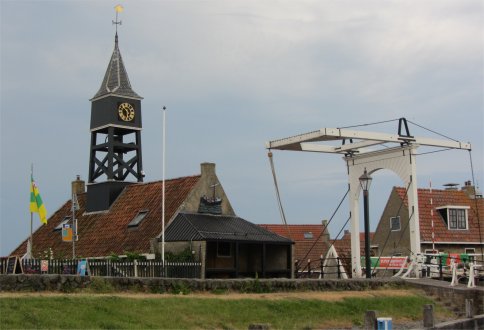 Sylhuis, the lockkeeper's house, with the Liars' Bench in front of it |
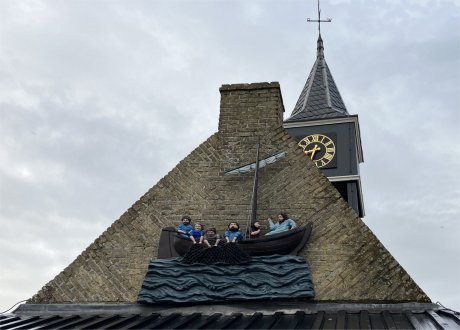 Sylhuis |
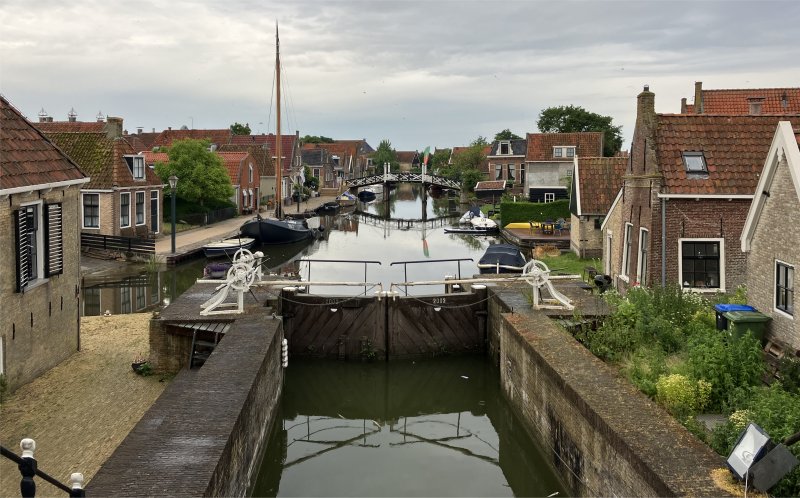 De Zijlroede |
Hindeloopen received city rights in 1225, and in 1368 it became a member of the Hanseatic League. Since the 12th and 13th centuries, Hindeloopen trading vessels undertook journeys to the North and Baltic Sea Coasts. The strong overseas connections with foreign countries and infrequent contact with the hinterland were probably the reasons for the development of the Hindeloopen language; a mixture of West Frisian, English, Danish, and Norwegian.
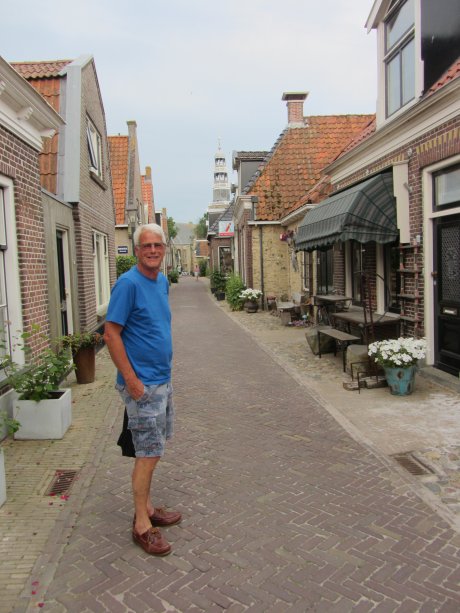 Deserted Buren |
We noted that quite a few bars and restaurants were shut, and not many people were on the streets. We strolled down Buren street which ended at the Grote Kerk with its tall tower, visible from miles out over the Ijsselmeer. In the Middle Ages a parish church existed in Hindeloopen, but was destroyed in 1570. It was rebuilt in 1593. During the 17th century the population of Hindeloopen grew significantly, and there was a need for a larger building. The old church was demolished and the foundation was laid for a new church building in 1632. More than 25 years later, the church was extended with a south aisle. It was only in 1683 when the tower was equipped with bells. During the years 1970-1975 both the interior and exterior restorations were carried out, and the tower, hanging well off balance, was somewhat "rectified".
Our luck turned. Just before the church at the very end of the street, we discovered the Sudersee was open, a restaurant we had visited before. We entered, ordered a beer, and sat outside. Sadly, rain appeared. We retired indoors, and got chatting with a Dutch couple on a nearby table. Rex, as always, spoke fluent Dutch; never fails to impress.
"I visited London once, to sing at the Albert Hall in a Dutch choir of 200 singers, in front of an audience of 9,000 people," the lady informed us. "We sang a mixture of Dutch and English songs."
"Well done for singing in English," I complemented her.
"I speak Dutch, Fries, English and German," she added.
The lady continued, "I had to fly to London since I am terribly afflicted with sea-sickness." So was Nelson I thought.
The couple then started to tell us about a Dutch man raising money for a charity by swimming, cycling and walking 200km over a course between Dokum and Leeuwarden. He had tried this before but pulled out with just 50km to go in the final walk. This year he was trying again, and they showed us numerous photos of the chap swimming, and his family.
The couple had to dash. Our waiter was a pleasant young fellow. I learned that he had studied at an International School where lessons are conducted in English, hence his excellent command of the language. Now he was studying chemical engineering.
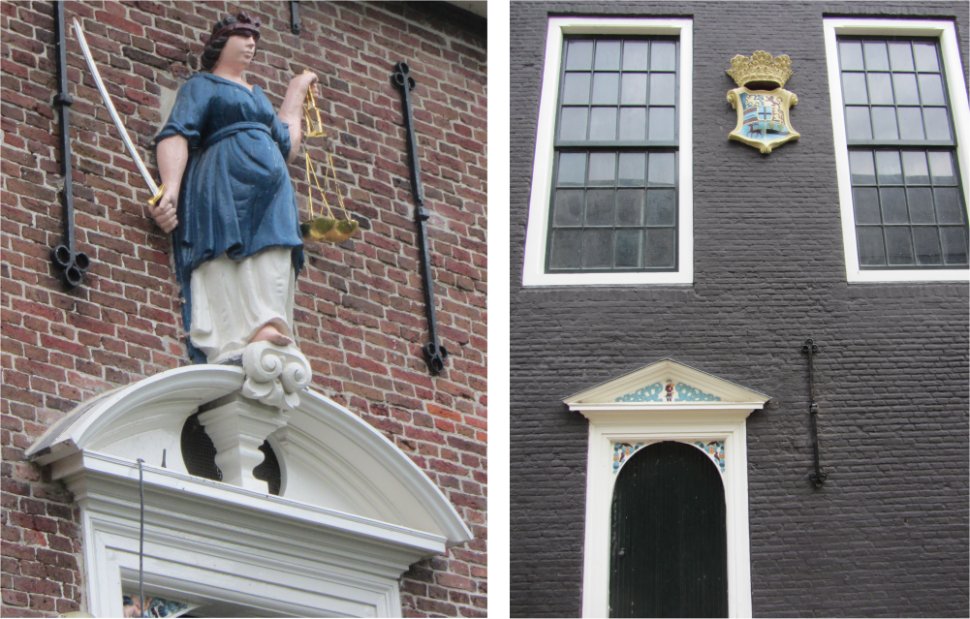 Hindeloopen Museum |
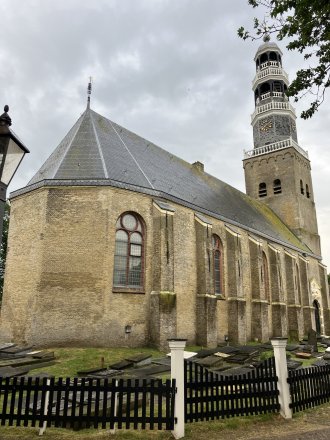 Hindeloopen Church |
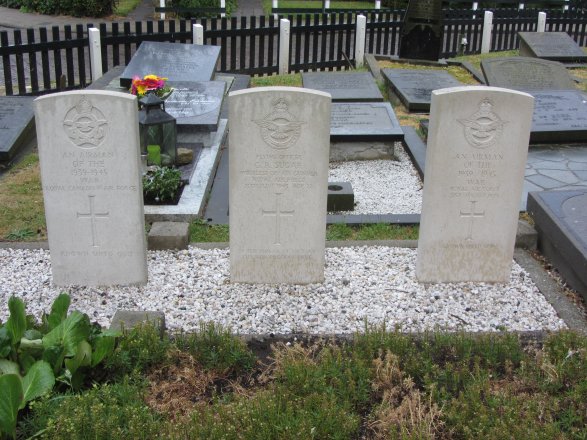 War Graves |
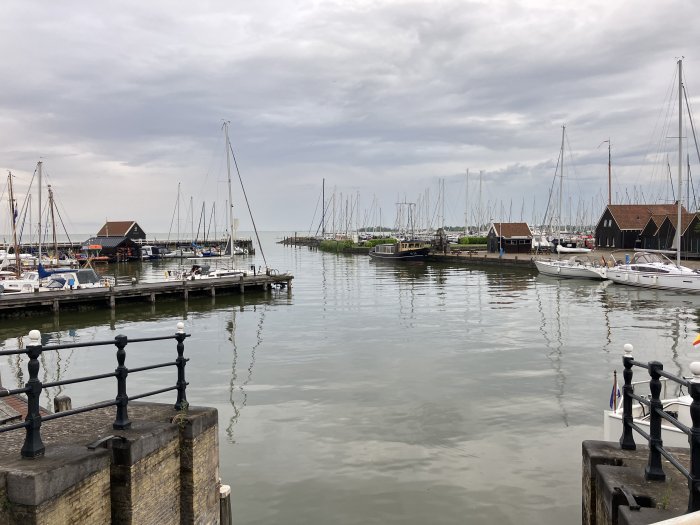 Hylper Haven |
I caught up with him surveying all the boats for sale at the marina. He filled me in on the relative merits and disadvantages of the boats, which were complete rip offs, many of which were ocean going vessels; a whole new learning curve to me.
We ended up on the boat with a beautiful sunset to observe in an ideal temperature. However, the decks were covered in water from the storm, so we declined to sit on them. In the dry cabin we planned our next stage of our journey to Harlingen.
